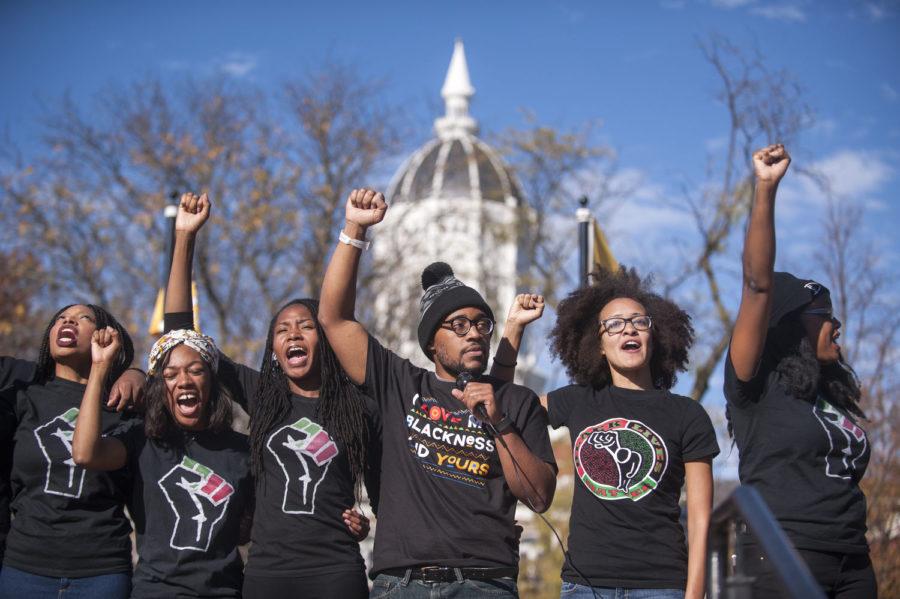SIUC students show solidarity with Mizzou
November 13, 2015
Carbondale students joined in national solidarity demonstrations to let students at the University of Missouri know they are not alone.
Racial issues at Mizzou started a series of demonstrations at universities across the country after threats were made to black students on campus.
SIUC’s Black Law Student Association wore all black Thursday to join in these peaceful demonstrations.
Advertisement
Cameron Woods, a second-year law student from Magnolia, Ark., is president of SIUC’s BLSA. He also organized the demonstration as a response to the events at Mizzou.
“We just really wanted to show some sense of solidarity,” Woods said. “They’re in our thoughts, they’re in our prayers and we want to continue moving this conversation forward.”
Anonymous threats were posted to the app Yik Yak after the resignation of both its president and chancellor because of their failure to properly address rising issues of hate at the university. One threat on Yik Yak read, “I’m going to stand my ground tomorrow and shoot every black person I see.”
Chris Hamm, president of the BLSA at Mizzou and friend of Woods, was on the Columbia campus when these threats were made Tuesday.
Hamm said a mock trial he was attending was canceled early to ensure everyone could get home safely. He said they made sure no one went home alone.
Two students have since been arrested and charged for making these threats.
“It’s bad that students should be afraid to go to class because of the threats that they are given,” said Ashley White, a second-year law student from Chicago studying Criminal Defense, who has been a member of BLSA since last year.
Advertisement*
Woods said the racial events at Mizzou have played out in history before.
“Just because it’s 2015 [it] does not change anything,” Woods said. “There are a lot of matters that didn’t get resolved in the Civil Rights movement.”
Hamm said the recent publicized racism is not new to Mizzou’s campus, where he is often called the “n-word.”
“It’s an interesting dynamic to go into town at night and not feel like you belong, like you’re being judged” Hamm said.
Students of color at predominantly white institutions like SIUC are still dealing with microaggressions, Woods said. He said he hopes this demonstration can show all black students are going through similar struggles.
Whitney Lundy, a first-year law student and member of BLSA from Hyde Park, N.Y., said she was not surprised by the events at Mizzou.
Lundy said since Michael Brown was killed by a police officer in Ferguson, Mo., protests and aggression toward black people seems to occur more frequently.
Lundy said she sees similar issues on SIUC’s campus. During a recent inclusion training, she heard people around her speak in biased, hateful and hurtful ways.
“It’s people who don’t want to step out of their comfort zone and learn what’s hurting minorities and what’s bothering them,” Lundy said. “They’re in this position of privilege and they don’t want to step out of it to really understand what everyone’s feeling.”
Lundy said she believes it’s important for students to feel well represented on campus, but she does not. SIU has a 20 percent black student population and Mizzou has an 8 percent black student population, according to Forbes.com.
Lundy said she is glad Mizzou students have gained national recognition, and that people are finding the courage to speak up.
“We’re students just like everyone else, but we don’t feel comfortable being ourselves,” Lundy said.
After threats were made against students’ lives on Yik Yak, some professors still held exams, which required students go to class, White said. White said these teachers made students choose between their safety and their education.
“More recognition should be given to situations like this,” White said. “This is something serious. It’s not the first time something like this has happened.”
Woods said even though racial injustice is present every day, it is not always recognized because he and others do not want to be referred to as overly sensitive. For this reason, he said there are often smaller issues no one speaks up about.
In school, black students are taught that they have overcome oppression, but that has not happened yet, Woods said.
“It’s just that racism has become more engrained in everyday society and we don’t see it.”
Now the issue has been brought to the forefront, Woods said. He said a plan on how to go forward needs to be discussed.
“I am cautiously optimistic because I think that change will come,” Hamm said about the current situation at Mizzou.
However, Hamm questions how long any change will last. He said he is optimistic about the appointment of Mike Middleton to the position of interim president Thursday. Middleton was the third black graduate of Mizzou’s law school, according to the Huffington Post.
Hamm said the next step is developing policy and strategizing with all students. “Everyone needs to come to a consensus policy change.” He said this policy change needs to help not just blacks, but every oppressed group.
Woods said students and universities need to be proactive instead of reactive.
“How can SIU take those steps to prevent what’s happening at Mizzou instead of letting those things come to rise and then dealing with them afterwards?” Woods said. “It will continue to happen if nothing is done about it.”
In the future, Woods said he hopes to have an open forum with students from all across campus to have a conversation about how today’s racial divide was reached and how to close it.
“There’s a tipping point,” Woods said. “We can only take so much of the microaggressions … before we say, okay, something needs to change.”
Anna Spoerre can be reached at [email protected] or @ASpoerre_DE
Advertisement









